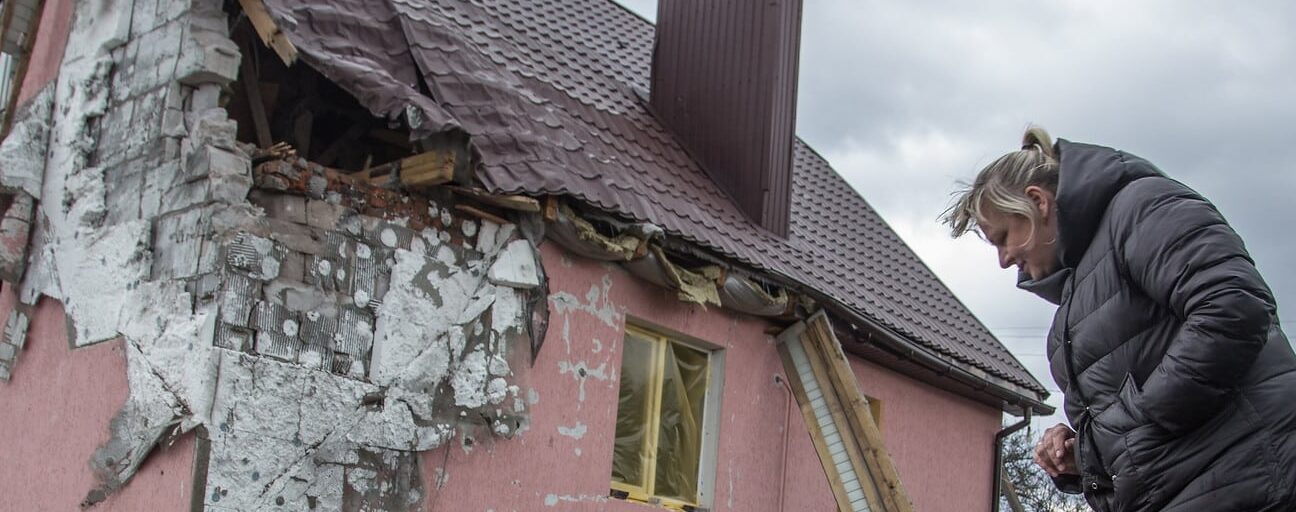Invasion of Ukraine one year on: Our work reaching the most vulnerable people
World Jewish Relief has a long-standing and deep connection with Ukraine.
We have been working in partnership with local organisations across the entire country for over thirty years. This put us in a unique position when it came to responding to urgent humanitarian needs, as we were able to quickly mobilise and send flexible funding to our partners.
In the year since Russia’s full-scale invasion of Ukraine we have supported our partners to reach 190,000 people through evacuations, food and NFI packages, winter support, psychological support, livelihood programmes, education and homecare.
Whilst we have historically targeted Ukraine’s Jewish community, our support, especially since 2014, reaches far beyond. We primarily target three groups: older people, people with disabilities and families in hardship, with around two thirds of our participants being women. These groups already faced overlapping structural disadvantages, which have been exacerbated by Russia’s full-scale and indiscriminate invasion.
The challenges with helping people with access needs
While it is impossible to identify exactly how many people in Ukraine have access needs, whether due to age, illness or disability, the number runs into the millions and is growing. An estimated 2.7 million Ukrainians have some form of disability, and this number is rising due to injuries sustained from combat and shelling. Ukraine’s population is also ageing, with the share of the population aged over 60 rising from 24% in 2020 to 28% at the end of 2022.
Evacuation has been uniquely challenging for people with access needs. Infrastructure has been severely damaged in parts of the country – in particular, with bridges being strategically destroyed – meaning that parts of certain journeys can only be made on foot. Suitably adapted vehicles – often ambulances – can be difficult to find. Overcrowding on trains and buses in the early days of the war meant that many were forced to abandon their mobility aids at home or in stations.
Those who have not evacuated are at greater risk during air raids, as most bomb shelters are underground, down flights of stairs, and are usually inaccessible. This has been exacerbated over the winter months when lifts are out of action during the frequent energy blackouts. Provision of torches, power stations, camping stoves and winter clothing to 14,000 people has been essential.
Subscribe to our newsletter
Our weekly email newsletter, Network News, is an indispensable weekly digest of the latest updates on funding, jobs, resources, news and learning opportunities in the international development sector.
Get Network NewsCollecting humanitarian aid is also difficult for people with access needs. Cash or shop vouchers are preferred, but challenging for those who struggle to travel to shops and have nobody to go for them, such as older people whose younger relatives have fled, which is the case for many of our older participants. It’s especially difficult for those who live close to the front line, where there are fewer shops and markets. These individuals often prefer aid packages, but also find it difficult to get to a distribution point and carry packages home.
For that reason, we try to do both – providing cash or vouchers to some, and packages for others, ensuring that contents and delivery are tailored to the individual. To date, we have provided cash or voucher support to over 4,000 people and provided over 150,000 targeted packages of food and household items.
Helping children
Some 5.7 million school-aged children have been affected since the start of the war. Over 2,500 educational institutions have been damaged, out of which almost 300 have been destroyed. Schools continue to suffer a lack of heating, and online learning requires additional technology and resources.
We have supported over 1,200 children and young people, using child-centred approaches to address the consequences of acute and ongoing exposure to conflict-related trauma and psychological stress, as well as lost learning needs and negatively affected social skills.
Younger children (6 – 13 years old) receive lessons in small groups after school or on weekends, individual tutoring, sessions with psychologists and speech therapists. Where possible, our projects offer offline activities in safe spaces with adequate bomb shelters and heating, as children who are exposed to regular socialisation tend to show less signs of childhood anxiety and perform better academically.
Our projects for teenagers (14 – 17) address their soft skills, psychological wellbeing and career aspirations. They provide group activities such as workshops, presentations, work experience, shadowing, as well as individual mentorship to nurture creative problem-solving skills.
90% of the school-age children we support have improved their academic grades, and 70% of our pre-school participants have improved their behaviour.
Parents are being supported to find jobs, importantly our Back to Work programmes paused for only two months and despite the conflict and its deep impact on the economy, employment rates of upwards of 40% are being achieved which in the circumstances are critical to help the country rebuild.
Ongoing challenges
The needs in Ukraine remain vast and varied across the country and it can sometimes feel like our programmes are a drop in the ocean. But our individualised, partnership approach ensures we meet those most in need with appropriate interventions and support. We have also been able to respond to needs of Ukrainians who have come to the UK on the ‘Homes for Ukraine’ scheme, assisting with employment and housing.
As we approach the anniversary of Russia’s invasion, it is incredible to see the resilience of Ukrainian people, and our colleagues on the ground, in what is certain to be a further protracted, complex conflict and ever-changing humanitarian landscape.
For now, we remain committed to supporting all our partners and participants as much as we possibly can, and remain, ever hopeful.
For more information about our work please visit the World Jewish Relief website.
Category
News & Views



